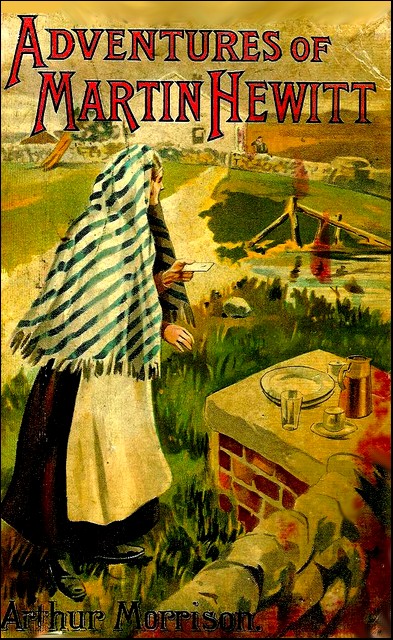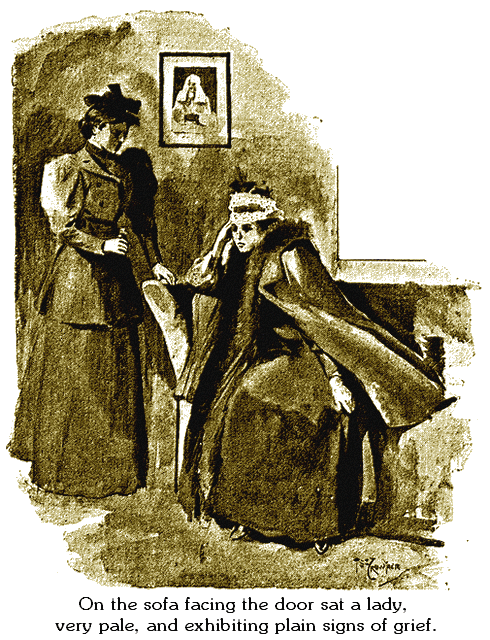Adventures of Martin Hewitt



RGL e-Book Cover 2014
©
THE WINDSOR MAGAZINE
BY T.S.C.
CROWTHER
First published as a series in
The Windsor Magazine
, Jan-Jun
1896
First book edition: Ward, Lock & Co., London, 1896
First published in the present form by
Roy Glashan’s Library and Project Gutenberg Australia, 2014
Produced by Colin Choat and Roy Glashan
Only the original raw text of this book is in the public domain.
All content added by RGL is proprietary and protected by copyright.

“Adventures of Martin Hewitt,” Ward, Lock & Co.,
London, 1896
- Illustration 1.
On the sofa facing the door sat a lady, very pale, and exhibiting plain
signs of grief. - Illustration 2.
“Those hinges were meant for a heavier gate than that.” - Illustration 3.
“This pattern of shoe is made especially for me.” - Illustration 4.
“What’s your name?” asked the inspector. - Illustration 5.
She sank with a groaning sob with her face on the head of the sofa. - Illustration 6.
“Daddy!” - Illustration 7.
Signs of some secret understanding. - Illustration 8.
Half-a-dozen rolls of linoleum. - Illustration 9.
Some piece of machinery which the nurseryman was most amicably passing to
his neighbour. - Illustration 10.
The stand-pipe in the nursery garden. - Illustration 11.
His first apprisal of the lady’s presence was a sharp drive in the
back. - Illustration 12.
The prisoners. - Illustration 13.
He mounted the ladder and looked in at the window - Illustration 14.
The boxes contained nothing but bricks. - Illustration 15.
It was a muddy mass, and they had to swill it … before it was seen to
be a linen bundle. - Illustration 16.
He stood there smoking his pipe before he went to bed. - Illustration 17.
The catch would simply swing into its appointed groove. - Illustration 18.
“Stop, sir! Let me see that!” - Illustration 19.
A pane of glass in my window was smashed. - Illustration 20.
The man struggled fiercely. - Illustration 21.
“Flitterbat Lancers” — musical notation. - Illustration 22.
Mr. Hoker - Illustration 23.
The woman began to belabour the invaders about the shoulders and head
from above. - Illustration 24.
“Flitterbat Lancers” — revised musical notation. - Illustration 25.
The fifth dancer slides. - Illustration 26.
Algernon Rewse. - Illustration 27.
“How long have you known Mr. Main?” - Illustration 28.
“Mrs. Hurley,” he said, “your clock keeps excellent time.” - Illustration 29.
“He laves another letther wid the dirtily’ plates an’ shouts for ut to be
posted.” - Illustration 30.
“An’ which is the honourable jintleman as do be burrnin’ to prisint me
wid a bit o’ goold?” - Illustration 31.
He took the tongs, and with one leg levered the stone up. - Illustration 32.
The Case of the Late Mr. Rewse — end graphic. - Illustration 33.
Slightly mollified by the tea… - Illustration 34.
“Reuben Penner,” I said, “shut up!” - Illustration 35.
“I am not a woman to be trifled with.” - Illustration 36.
“Cab, mum?” - Illustration 37.
The boy stared hard at Hewitt.
First published in
The Windsor Magazine
, March 1896
It has struck me that many of my readers may wonder that, although I have
set down in detail a number of interesting cases wherein Hewitt figured with
success, I have scarcely as much as alluded to his failures. For failures he
had, and of a fair number. More than once he has found his search met,
perhaps at the beginning, perhaps after some little while, by an impenetrable
wall of darkness through which no clue led. At other times he has lost time
on a false trail while his quarry escaped. At others still the stupidity or
inaccuracy of some person upon whom he has depended for information has set
his plans to naught. The reason why none of these cases have been embodied in
the present papers is simply this; that a problem with no answer, a puzzle
with no explanation, an incident with no satisfactory end, as a rule lends
itself but poorly to purposes of popular narrative, and it is often difficult
to make understood and appreciated any degree of skill and acumen unless it
produces a clear and intelligible result. That such results attended Hewitt’s
efforts in an extraordinary degree those who have followed my narratives so
far will need no assurance; but withal impossibilities still remain
impossibilities, for Hewitt as for the dullest creature alive. On some other
occasion I may perhaps set out at length a case in which Martin Hewitt
achieved nothing more than unqualified failure; for the present I shall
content myself with a case which, although it was completely cleared up in
the end, yet for some while baffled Hewitt because of some of the reasons I
have alluded to.
On the ground floor of the building wherein Hewitt kept his office, and in
which I myself had my chambers, were the offices of Messrs. Streatley and
Raikes, an old-fashioned firm of family solicitors. Messrs. Streatley and
Raikes’s junior clerk appeared in Hewitt’s outer office one morning with the
query, “Is your guv’nor in?”
Kerrett admitted the fact.
“Will you tell him Mr. Raikes sends his compliments and will be obliged if
he can step downstairs for a few minutes? It’s a client of ours—a
lady—and she’s in a great state about losing her baby or something. Say
Mr. Raikes would bring her up only she seems too ill to get up the
stairs.”
This was the purport of the message which Kerrett brought into the inner
room, and in three minutes Hewitt was in Streatley and Raikes’s office.
“I thought the only useful thing possible would be to send for you, Mr
Hewitt,” Mr. Raikes explained; “indeed, if my client had been better
acquainted with London no doubt she would have come to you direct. She is in
a bad state in the inner office. Her name is Mrs. Seton; her husband is a
recent client of ours. Quite young, and rather wealthy people, so far as I
know. Made a fortune early, I believe, in South Africa, and calve here to
live. Their child—their only child, a little toddler of two years or
thereabout—disappeared yesterday in a most mysterious way, and all
efforts to find it seem to have failed as yet. The police have been set going
everywhere, but there is no news as yet. Mrs. Seton seems to have passed a
dreadful night, and could think of nothing better to do this morning than to
come to us. She has her maid with her, and looks to be breaking down
entirely. I believe she’s lying on the sofa in my private room now. Will you
see her? I think you might hear what she has to say, whether you take the
case in hand or not; something may strike you, and in any case it will
comfort her to get your opinion. I told her all about you, you know, and she
clutched at the chance eagerly. Shall I see if we may go in?”
Mr. Raikes knocked at the door of his inner sanctum and waited; then he
knocked again and set the door ajar. There was a quiet “Come in,” and pushing
open the door the lawyer motioned Hewitt to follow him.
On the sofa facing the door sat a lady, very pale, and exhibiting plain
signs of grief and physical weariness. A heavy veil was thrown back over her
bonnet, and her maid stood at her side holding a bottle of salts. As she saw
Hewitt she made as if to rise, but he stepped quickly forward and laid his
hand on her shoulder. “Pray don’t disturb yourself, Mrs. Seton,” he said;
“Mr. Raikes has told me something of your trouble, and perhaps when I know a
little more I shall be able to offer you some advice. But remember that it
will be very important for you to maintain your strength and spirits as much
as possible.”

“This is Mr. Martin Hewitt, you know,” Mr. Raikes here put in—“of
whom I was speaking.”
Mrs. Seton inclined her head and with a very obvious effort began.
“It is my child, you know, Mr. Hewitt—my little boy Charley; we
can’t find him.”
“Mr. Raikes has told me so. When did you see the child last?”
“Yesterday morning. His nurse left him sitting on the floor in a room we
call the small morning-room, where we sometimes allowed him to play when
nurse was out, because the nursery was out of hearing, except from the
bedrooms. I myself was in the large morning-room, and as he seemed to be very
quiet I went to look, and found he was not there.”
“You looked elsewhere, of course?”
“Yes; but he was nowhere in the house, and none of the servants had seen
him. At first I supposed that his nurse had gone back to the small
morning-room and taken him with her—I had sent her on an
errand—but when she returned I found that was not the case.”
“Can he walk?”
“Oh, yes, he can walk quite well. But he could scarcely have come out from
the room without my hearing him. The two rooms, the morning-room and the
small sitting-room, are on opposite sides of the same passage.”
“Do the doors face each other?”
“No; the door of the small room is farther up the passage than the other.
But in any case he was nowhere in the house.”
“But if he left the room he must have got out somehow. Is there no other
door?”
“Yes, there is a French window, with the lower panels of wood, in the
room; it gives on to a few steps leading down into the garden; but that was
closed and bolted on the inside.”
“You found no trace whatever of him, I take it, on the whole
premises?”
